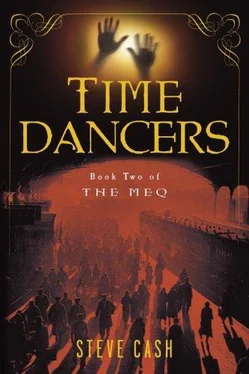Steve Cash - Time Dancers
Здесь есть возможность читать онлайн «Steve Cash - Time Dancers» весь текст электронной книги совершенно бесплатно (целиком полную версию без сокращений). В некоторых случаях можно слушать аудио, скачать через торрент в формате fb2 и присутствует краткое содержание. Год выпуска: 2006, ISBN: 2006, Издательство: Del Rey, Жанр: Фэнтези, Детективная фантастика, ya, на английском языке. Описание произведения, (предисловие) а так же отзывы посетителей доступны на портале библиотеки ЛибКат.
- Название:Time Dancers
- Автор:
- Издательство:Del Rey
- Жанр:
- Год:2006
- ISBN:0345470931
- Рейтинг книги:4 / 5. Голосов: 1
-
Избранное:Добавить в избранное
- Отзывы:
-
Ваша оценка:
- 80
- 1
- 2
- 3
- 4
- 5
Time Dancers: краткое содержание, описание и аннотация
Предлагаем к чтению аннотацию, описание, краткое содержание или предисловие (зависит от того, что написал сам автор книги «Time Dancers»). Если вы не нашли необходимую информацию о книге — напишите в комментариях, мы постараемся отыскать её.
Time Dancers — читать онлайн бесплатно полную книгу (весь текст) целиком
Ниже представлен текст книги, разбитый по страницам. Система сохранения места последней прочитанной страницы, позволяет с удобством читать онлайн бесплатно книгу «Time Dancers», без необходимости каждый раз заново искать на чём Вы остановились. Поставьте закладку, и сможете в любой момент перейти на страницу, на которой закончили чтение.
Интервал:
Закладка:
Sak was shocked, but I wasn’t, nor was Sailor. It made perfect sense in the Fleur-du-Mal’s mind to eliminate anyone who had assisted him in finding his fortress, then leave his grotesque signature and calling card behind for much darker reasons.
“Shutratek,” Sailor said, “do you know the location of this place?”
“No,” she answered. Shutratek saw the disappointment spread across Sailor’s face. “I never learn…they never tell,” she said.
I looked over at Sailor and he looked at me. His “ghost eye” clouded over and swirled. We were in Japan all right, but it felt like we were back at the beginning.
“We’ll find it, Sailor,” I said. “And we’ll find her. ”
“I will go with you,” Sak said. There was a fury in his eyes I understood well.
“And so I,” Shutratek said, taking Sak’s hand in hers.
By April, our search was under way. We traveled together posing as grandparents and grandchildren. Sak and Shutratek played their parts well. Sailor and I darkened our faces and all of us dressed simply. We were rarely stopped and both Sak and Shutratek could ask our questions and make our inquiries. We used buses and trains, crisscrossing the landscape and following whatever information we could uncover, which was little or none. The hardest part of the puzzle was in knowing and defining exactly what we were seeking. The medieval castle of Japan is called a shiro and there were less than a hundred not in ruins. But as Sailor pointed out, the Fleur-du-Mal would prize the location of the fortress more than condition. He would have it renovated to his specifications regardless of its physical state. This made the number of possible locations increase tenfold. The entire northern island and province of Hokkaido was eliminated from the search because of its isolation. Tokyo was taken from the list for the opposite reason—it was too convenient and likely to be bombed first if war broke out. We thought it more probable the Fleur-du-Mal would choose somewhere in the mountains or along the coast. Therefore, we ignored the plains-type castles and fortresses and concentrated on the mountain castles, which are a different type of structure and all located in central and southern Honshu or on the island provinces of Shikoku and Kyushu.
That first summer and fall, Sailor remained patient in our search, although his dreams continued nightly. He didn’t talk about them, but gradually his eyes showed concern, frustration, and alarm. The military presence and increasing numbers of soldiers everywhere, combined with the fanatic actions, attitudes, and speeches of their leaders, made him feel certain war with the West was imminent. Sailor said he agreed with Zeru-Meq, who loved all of Japan and Japanese culture, but hated the Japanese Empire.
We pushed on through the winter and spring and into the following summer. The fall of 1941 found us in and around the ancient capital of Nara. By December, we had moved to Kyoto and were staying as guests of a Sumi-e master Sailor and Sak had befriended. On the eighth of December, Shutratek and I awoke early and walked down to the open market. As we entered, the smell of daikon was everywhere, overpowering and masking the other fresh scents in the market. Music was blaring through a loudspeaker directly above the daikon stand. At seven o’clock, the Japan Broadcasting Corporation began their first news broadcast of the day. The local population usually paid little attention to the radio, but that morning they all stopped precisely where they were standing and every one of them acted stunned by what they heard. I asked Shutratek what the man had said. She blinked once, as if waking herself, then translated literally: “The Army and Navy divisions of Imperial Headquarters jointly announced at six o’clock this morning, December 8, that the Imperial Army and Navy forces have begun hostilities against the American and British forces in the Pacific at dawn today.” World War II had finally erupted. From that moment on, I could not smell daikon without thinking of war.
That evening, Sailor and I discussed our plight and tried to speculate on where Opari, Geaxi, Mowsel, Ray, and Nova might be, or more accurately, where they got caught, because from now on it would be impossible to move at will. We also assumed we had missed our chance to find Susheela the Ninth before the Fleur-du-Mal returned. Sailor was certain the Fleurdu-Mal was already in Japan, or would be shortly. Once he returned, there was no predicting what he might have in mind for Susheela the Ninth. This thought upset Sailor visibly. His face tightened and his “ghost eye” clouded and blackened like a thunderstorm. Much later that night, Sailor shook me awake and held me by the shoulders, staring at me. His “ghost eye” was completely clear.
“She is awake,” he said through gritted teeth.
“Who? Who is awake?” I asked. Sailor looked furious. I had never seen him so angry.
“Susheela the Ninth is awake. She is no longer denbora dantza egin… timedancing.”
“Is that bad?”
Sailor spit out his answer in a bitter, low voice. “Zuriaa is torturing her, Zianno!”
From that moment on, World War II became agony for Sailor. Every day he sank deeper in despair because every night he heard the sighs and screams of Susheela the Ninth. I also began having another series of dreams about Opari. In the dreams, she was always alone, but I couldn’t quite reach her, and she was always standing among bodies, always the broken bodies. I would wake in a sweat, knowing she was on the planet somewhere. I ached inside to know where. News from anywhere other than Japan was unknown. I worried constantly for Arrosa, Koldo, Willie, Caine, and Star, who were probably in Europe and in harm’s way. Many times I wondered where Jack was and what he could be doing. I knew Carolina would be in St. Louis, waiting…waiting for all of us.
Still, we persisted. As Sailor put it, “Our war is with Time, not the Japanese.” The war did make everything we did and everywhere we went a dangerous activity. Strangers, even Ainus, asking strange questions on the home front during a war will only arouse suspicion and make people reluctant to answer. Sak and Shutratek never seemed to lose their resolve and their belief that we would surely find the fortress in the next town, near the next city, over the next hill. And we kept on, despite the war. We traveled to Osaka, Nagoya, Okayama, Kobe, and back to Kyoto. We saw the castles of Hamamatsu-Jo, Matsue-Jo, Odawara-Jo, and dozens of others, some completely intact and some completely in ruins. None had any connection to the Fleur-du-Mal, past or present. The years of 1942 and 1943 became a blur. We had no true idea of how the war was going. The Japanese only spoke of great and glorious victories for the Emperor, never defeats. But by the end of 1944, conditions had spiraled downward rapidly. Food shortages and clothing shortages were critical. There was little or no gasoline and oil. Bicycles and carts hauled most people and things around, and we even heard rumors Japan might be losing.
All this time, we were never once stopped or interrogated. Sak and Shutratek became good and close friends to Sailor and me. Shutratek had tremendous stamina for a woman in her mid-sixties, yet I could see in her face that our constant travel was taking its toll. Sak seemed to only get stronger as time went by. His clear obsession to avenge his father and brother drove him on like fuel.
In May, we learned of Germany’s surrender and Sailor and I believed an invasion of Japan could not be far away. Sailor feared the chaos of an invasion would be worse than existing conditions. Then the fire bombing of Tokyo and other cities increased and intensified and women and children were being evacuated from all the cities to anywhere available. Trains and roads became clogged or shut down, but by August, we were on the island province of Kyushu in the city of Kitakyushu. On the fifth, Sak and Shutratek visited Kokura Castle and met with the family of the staff who served under Mori Ogai at the turn of the twentieth century. Within minutes, we had our break. Not one, but two fortresses in the Nagasaki prefecture had been purchased and restored extensively during that time by the same buyer. One castle was in Nagasaki itself and the other fifteen miles away in the hills above Oomura Bay, northeast of the old Portuguese properties.
Читать дальшеИнтервал:
Закладка:
Похожие книги на «Time Dancers»
Представляем Вашему вниманию похожие книги на «Time Dancers» списком для выбора. Мы отобрали схожую по названию и смыслу литературу в надежде предоставить читателям больше вариантов отыскать новые, интересные, ещё непрочитанные произведения.
Обсуждение, отзывы о книге «Time Dancers» и просто собственные мнения читателей. Оставьте ваши комментарии, напишите, что Вы думаете о произведении, его смысле или главных героях. Укажите что конкретно понравилось, а что нет, и почему Вы так считаете.












